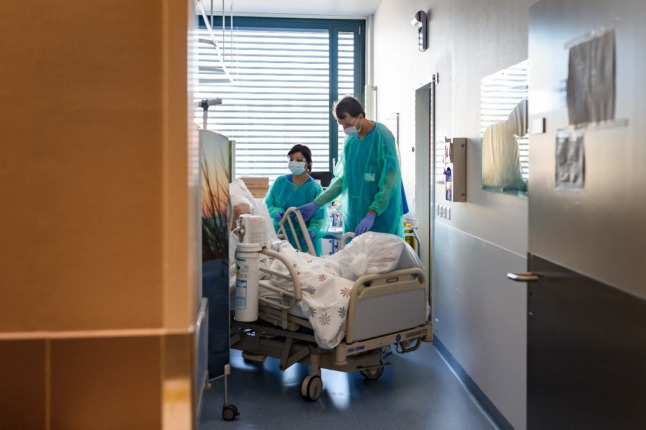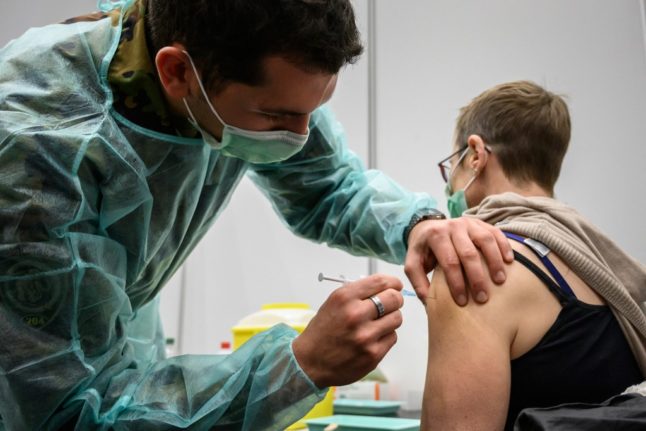This article was last updated in early September, 2021.
Each week, the Swiss Federal Office of Public Health releases up to date figures on the number of confirmed infections in the country, as well as hospitalisation and death info.
When cross-referenced with the people who have been vaccinated, the data gives an indication as to the true danger the virus poses to people who have already had the jab.
It also provides some valuable context to the highly publicised ‘success rate’ of Covid vaccines.
For both of the vaccines administered in Switzerland – the Moderna and Pfizer/Biontech jab – there is a success rate in the 90 percent range.
EXPLAINED: Why Switzerland rejects obligatory vaccinations for some professions
The hard data illustrates how low the risk is in Switzerland of catching Covid if you have been vaccinated – with an even lower risk of illness or even death.
What does the data show about catching Covid when vaccinated in Switzerland?
In total, just under 4,400,000 people are fully vaccinated (i.e. have received two shots) in Switzerland.
This works out to be roughly 50 percent of the Swiss population, with a further 5.6 percent of Swiss having had one dose as at August 5th.
Of the 4,199,690 people who have been fully vaccinated in Switzerland, 460 are confirmed to have caught the coronavirus since January of 2021.
As a percentage, that is 0.01 percent of all of those who have had the jab.
Swiss health officials however point out that this is only confirmed cases.
Given that those who have been vaccinated will avoid the worst symptoms of the virus, there is the chance that some of those who have been vaccinated have had the virus without knowing and without getting a confirmed test.
“The number of cases is an underestimation because there are people who caught Covid after being vaccinated who were neither recorded in a hospital nor on an outpatient basis,” the FOPH wrote.
“The numbers are therefore slightly higher. Despite this uncertainty, these cases of fully vaccinated people who become infected are low and they are within the expected range.”
What about hospitalisations and deaths?
While the number of confirmed cases is remarkably low, the figures are even lower for people who have been hospitalised or who have died after being vaccinated.
According to science journalist Volkart Wildermuth, if people over the age of 80 have a 10 percent chance of dying from Covid, vaccination can reduce this to one percent.
“That’s a big difference,” he told Deutschland Funk on Monday.
In total, there have been 96 hospitalisations out of 4,199,690 vaccinated people. This works out to 0.002 percent.
Of those who have been hospitalised, one was in their 30s, four in their 40s, 11 in their 50s, nine in their 60s, 21 in their 70s and 50 over the age of 80.
Of the total number of people who have been vaccinated fully since Switzerland’s vaccination campaign began in late 2020, there have been 19 deaths.
This works out to 0.0005 of those who have been fully vaccinated.
One of those who died was in their 50s, while the remaining 18 were above the age of 80.
Therefore, while the vaccines are not 100 percent effective in preventing catching the virus, being hospitalised and dying, the statistical possibility is remarkably low.
Why is this happening?
As stated above, vaccines (Covid and others) are not 100 percent effective. This means, at least in case of Moderna and Pfizer, that a small percentage of people might still get contaminated.
As FOPH figures show, the effectiveness of vaccination is significantly higher in high-risk patients, including the elderly and people with chronic illnesses.
While this group of people was hospitalised most often before the immunisation campaign was launched, they are currently the least affected by breakthrough cases, as the rate of vaccination among this group exceeds 80 percent.
Among people over 60 years of age, 51 of 56 who caught the virus were not vaccinated. Only five ended up in the hospital despite being inoculated, according to Watson’s data.
However, Walter Zingg, chief medical officer of the infectious disease department at the University Hospital Zurich pointed out to Swiss news outlet Watson that “it is difficult to keep meaningful statistics”, due to the low number of cases.
Can vaccinated people die from Covid?
It is very unlikely and severe outcomes remain very rare.
“Those who are vaccinated hardly ever end up in the hospital, let alone in intensive care”, Zingg said.
Also, the course of the disease is much milder in people who have been vaccinated.
“Vaccinated people who end up in hospital often only needed extra oxygen,” rather than intubation, according to Peter Vollenweider, head of the department of internal medicine at Vaud’s University Hospital (CHUV).



 Please whitelist us to continue reading.
Please whitelist us to continue reading.
Member comments